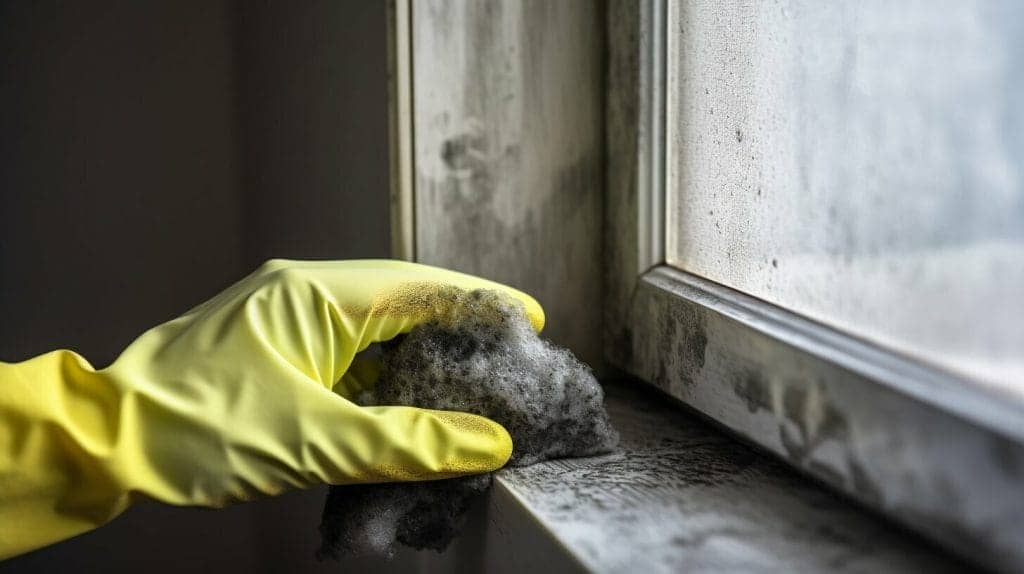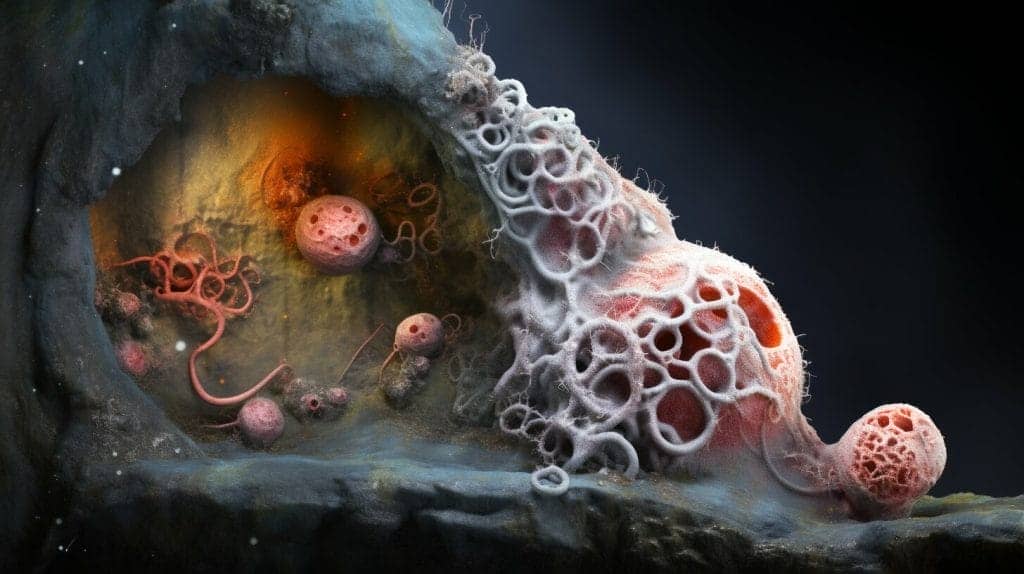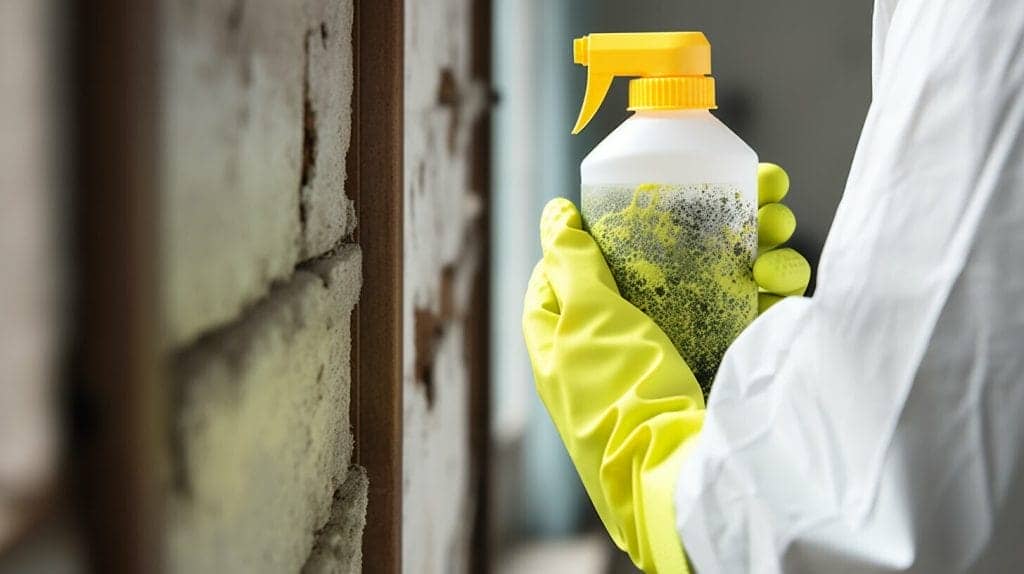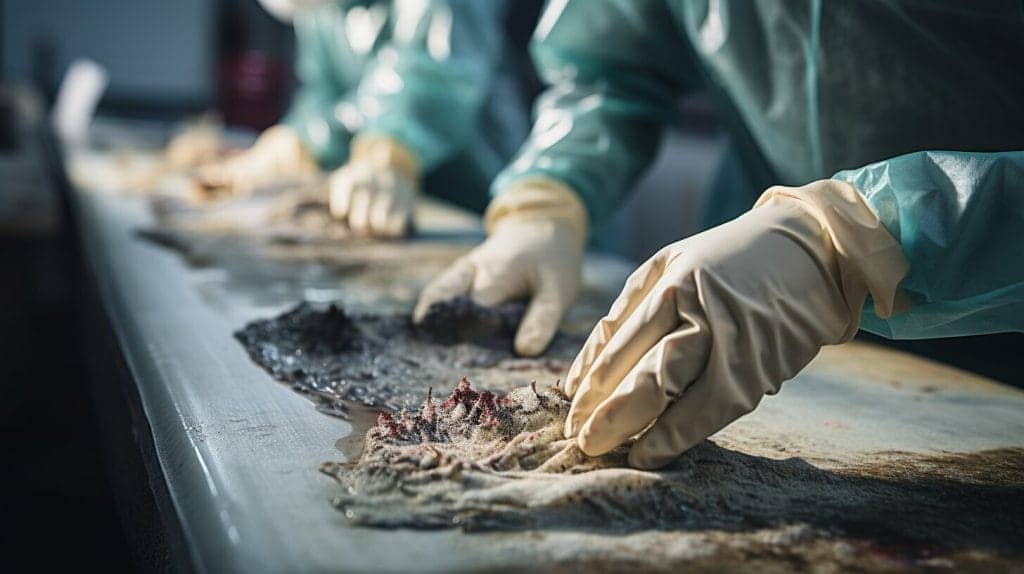Mold exposure can have serious health implications, including respiratory issues and allergic reactions. Certain individuals may be more susceptible to mold-related health issues due to their genetic makeup. Understanding genetic markers for mold susceptibility is becoming increasingly important in identifying vulnerable individuals and developing personalized prevention and treatment approaches.
Genetic markers can help identify susceptibility to mold exposure and provide opportunities for personalized interventions. By understanding an individual’s genetic susceptibility to mold, healthcare providers can tailor prevention and treatment plans to their specific needs.
Key Takeaways
- Genetic markers can help identify vulnerability to mold exposure.
- Understanding genetic susceptibility to mold is important for developing personalized prevention and treatment approaches.
- Identifying genetic markers for mold susceptibility can guide targeted interventions for individuals at risk.
Understanding Mold Susceptibility: The Role of Genetic Variation
Genotyping for mold susceptibility is a valuable tool in identifying individuals who may be more vulnerable to mold-related health issues. Mold susceptibility genes have been identified through extensive research, with DNA markers for mold susceptibility playing a critical role in understanding the genetic basis of mold sensitivity.
Through genotyping, scientists can identify specific gene variations that increase an individual’s risk of mold exposure. These variations may impact an individual’s immune response or ability to detoxify harmful mold toxins, contributing to the development of various health conditions.
The role of DNA markers for mold susceptibility in understanding individual vulnerability to mold is an active area of research. As scientists continue to explore genetic variations and their association with mold exposure, it becomes possible to develop targeted interventions for prevention and treatment.
Exploring Mold Susceptibility Genes
While several genes have been identified as playing a role in mold susceptibility, there is no single genetic marker for mold sensitivity. Instead, multiple genes may contribute to an individual’s vulnerability to mold.
One example is the HLA-DR gene, which plays a critical role in the immune system’s response to foreign invaders. Variations in this gene have been linked to an increased risk of mold sensitivity, indicating that the immune response may be a key factor in the development of mold-related health issues.
Other genes that may contribute to mold susceptibility include those involved in detoxification processes and inflammation pathways. Variations in these genes may impact an individual’s ability to eliminate mold toxins and respond to the inflammatory effects of mold exposure.
The Role of DNA Markers for Mold Susceptibility
Understanding DNA markers for mold susceptibility is a critical step in developing personalized approaches to mold prevention and treatment. By identifying specific gene variations that increase an individual’s risk of mold exposure, it becomes possible to develop targeted interventions.
For example, an individual with a variation in the HLA-DR gene may benefit from immune system support and preventative measures to reduce mold exposure. Similarly, an individual with a variation in a gene involved in detoxification processes may benefit from targeted nutritional support to promote the elimination of mold toxins from the body.
As research continues to explore the role of DNA markers for mold susceptibility, it is becoming increasingly clear that a personalized approach to mold prevention and treatment may be the most effective way to address mold-related health issues.
Genetic Risk Factors for Mold Exposure: Exploring the Science
Scientific research has identified specific gene variations that contribute to an individual’s susceptibility to mold-related health issues. These genetic risk factors can interact with environmental factors, such as exposure to mold spores, to increase the risk of health problems.
One of the main gene variations associated with mold susceptibility is the HLA-DR gene. This gene, which plays a role in the immune system, is involved in the body’s response to mold exposure. Studies have found that certain versions of the HLA-DR gene are associated with an increased risk of mold-related respiratory symptoms and illnesses.
Other gene variations that have been linked to mold susceptibility include genes involved in inflammation, detoxification, and antioxidant defense. For example, variations in genes involved in the body’s production of glutathione, an antioxidant that helps protect against the harmful effects of mold exposure, may increase the risk of health problems.
However, it is important to note that genetic risk factors for mold exposure are not the only factor involved in an individual’s susceptibility to mold-related health issues. Other factors, such as overall health status and duration of exposure, can also play a significant role.
By understanding these genetic risk factors, individuals and healthcare providers can develop personalized approaches to prevention and treatment. For example, those who are genetically susceptible to mold exposure may benefit from targeted interventions, such as increased ventilation and air filtration in their homes or workplaces. These individuals may also benefit from comprehensive testing and personalized treatment plans that address both the genetic and environmental factors contributing to their susceptibility to mold-related health issues.
Genetic Testing for Mold Sensitivity: A Personalized Approach
Genetic testing for mold sensitivity is becoming increasingly recognized as a valuable tool for identifying individuals who are more susceptible to mold-related health issues. This personalized approach to mold toxicity diagnosis can help individuals understand their genetic risk factors, and take proactive measures to prevent exposure.
By analyzing an individual’s DNA, genetic tests for mold sensitivity can identify specific gene variations that may increase their vulnerability to mold exposure. This information can be used to guide preventive measures, such as avoiding mold-contaminated environments, implementing air filtration systems, and taking steps to reduce humidity levels.
Additionally, genetic testing can inform personalized treatment plans for individuals with mold sensitivity. By understanding an individual’s genetic makeup, doctors can tailor treatment approaches to address their specific needs. For example, some individuals may benefit from immune system support or detoxification therapies, while others may require nutritional support to strengthen their bodies’ natural defenses.
At Oasis Medical Institute, a holistic approach to mold toxicity treatment is taken, combining conventional medicine with complementary therapies. The personalized treatment program is based on a thorough evaluation of each patient’s unique needs, including genetic testing for mold sensitivity. By incorporating these advanced diagnostics, patients receive a tailor-made approach to their mold-related health issues.
If you suspect you may be experiencing symptoms related to mold toxicity, it may be beneficial to undergo genetic testing for mold sensitivity. This can help you understand your risk factors and take preventative measures to protect your health. To learn more about the holistic Mold Toxicity treatment program at Oasis Medical Institute and to book a consultation, please call 866-868-1992.
The Impact of Mold Exposure on Health
Mold exposure can have a significant impact on an individual’s health, particularly for those who are genetically susceptible. Genetic susceptibility to mold is a growing concern in the United States, with the potential to lead to respiratory issues, allergies, and other symptoms.
Research has shown that genetic markers for mold susceptibility can help identify those who are more vulnerable to mold-related health issues. Understanding an individual’s genetic susceptibility to mold can lead to personalized prevention and treatment approaches, including genetic testing for mold sensitivity and the implementation of targeted interventions.
It is important to address mold susceptibility and potential exposure in order to prevent the development of serious health conditions, especially for those who are genetically predisposed. By identifying vulnerable individuals through genetic markers for mold susceptibility, early detection and personalized interventions can be implemented to promote overall health and wellbeing.
Holistic Treatments for Mold Toxicity at Oasis Medical Institute
Oasis Medical Institute, located in Tijuana, MX, offers a unique and integrative approach to treating mold toxicity. Dr. Francisco Contreras MD leads the team of experienced medical professionals who provide personalized holistic treatments to address the underlying causes of mold-related health issues.
Patients who seek treatment at Oasis Medical Institute will undergo a thorough evaluation to determine their individual needs. The holistic treatment program may include a combination of detoxification, nutritional support, immune system strengthening, and other therapies tailored to the patient’s specific condition and genetic make-up.
One of the key components of the holistic treatment program at Oasis Medical Institute is the focus on improving the patient’s overall health and well-being. This approach recognizes that treating mold-related health issues goes beyond simply addressing specific symptoms or illnesses. By taking a comprehensive approach to health, patients can improve their quality of life and reduce their susceptibility to future health concerns.
| Benefits of Holistic treatments at Oasis Medical Institute: |
|---|
| Personalized treatment plan tailored to the patient’s specific condition and genetic make-up. |
| Comprehensive approach to health, improving patients’ overall quality of life. |
| Experienced team of medical professionals led by Dr. Francisco Contreras MD. |
| Focused on identifying and addressing the underlying causes of mold-related health issues. |
At Oasis Medical Institute, patients receive a level of care and attention that goes beyond what is typically provided in conventional medical settings. The team of experienced medical professionals is committed to working closely with patients to improve their health and well-being.
If you are experiencing mold-related health issues, consider booking a consultation at Oasis Medical Institute by calling 866-868-1992. The holistic Mold Toxicity treatment program can help you identify the underlying causes of your condition and provide personalized treatment options to improve your health and quality of life.
The Integrative Approach to Mold Toxicity Treatment
At Oasis Medical Institute, Dr. Francisco Contreras MD takes an integrative approach to mold toxicity treatment. This comprehensive treatment program combines conventional medicine with holistic therapies to address mold-related health issues from various angles.
The holistic treatment program at Oasis Medical Institute may include detoxification, nutritional support, immune system strengthening, and other therapies depending on an individual’s unique needs. The program aims to address the underlying causes of mold toxicity and promote overall health.
This integrative approach has proven to be effective in addressing mold-related health issues and providing patients with personalized treatment plans. By addressing the root cause of mold toxicity, rather than just treating the symptoms, patients are able to achieve long-lasting improvements in their health and well-being.
Booking a Consultation at Oasis Medical Institute
If you’re interested in seeking personalized treatment for mold-related health issues, book a consultation at Oasis Medical Institute today. Their holistic Mold Toxicity treatment program, led by Dr. Francisco Contreras MD, combines conventional medicine with a range of holistic therapies, providing a comprehensive approach to healing.
To book your consultation, call 866-868-1992. Their friendly team of experts will assist you in scheduling your appointment and answering any questions you may have.
Don’t wait to take control of your health. Contact Oasis Medical Institute today and start your journey towards vibrant health and wellness.
The Importance of Identifying Vulnerability to Mold
Identifying vulnerability to mold is crucial for preventing and treating mold-related health issues. Genetic markers for mold susceptibility are a cutting-edge diagnostic tool that can provide crucial insights into an individual’s susceptibility to mold.
With genetic testing and analysis, individuals can identify specific gene variations that contribute to an increased risk of mold exposure. This information can then be used to take proactive measures to prevent mold exposure, such as improving indoor air quality or avoiding high-risk environments.
Early detection of mold susceptibility can also guide personalized interventions and treatment plans for individuals with mold-related health issues. By understanding the underlying genetic factors that contribute to mold sensitivity, healthcare providers can develop targeted and effective treatment strategies.
In conclusion, identifying vulnerability to mold through genetic markers is a powerful tool for promoting public health. As research continues to advance, genetic testing for mold sensitivity will become an increasingly accessible and valuable resource for individuals seeking to understand and manage their health risks.
The Future of Mold Susceptibility Research
Research on genetic markers for mold susceptibility has made significant progress in recent years, but the field is still in its early stages. There is a need for more comprehensive studies to identify additional genes and DNA markers associated with mold exposure susceptibility. Such research would have a significant impact on the development of personalized prevention and treatment approaches.
One area of focus for future research is identifying the specific biological mechanisms through which genetic variations increase susceptibility to mold exposure. By understanding these mechanisms, scientists could develop new interventions to mitigate the impact of mold on health.
Another area of research is investigating the relationship between mold exposure and other health conditions, such as autoimmune disorders and cancer. By understanding these links, researchers may be able to develop more effective treatment approaches that address the root causes of these health issues.
Overall, the future of mold susceptibility research is bright, with significant potential for continued progress in identifying genetic markers for susceptibility, developing personalized interventions, and improving public health outcomes.
The Conclusion: Understanding and Addressing Genetic Susceptibility to Mold
In conclusion, genetic markers for mold susceptibility have emerged as an essential tool for understanding the impact of mold exposure on one’s health. The identification of specific genes associated with an increased risk of mold exposure has opened up the possibility for personalized prevention and treatment approaches.
The holistic Mold Toxicity treatment program at Oasis Medical Institute in Tijuana, MX, offers a comprehensive approach to addressing mold-related health issues. Dr. Francisco Contreras MD’s integrative approach combines conventional medicine with holistic therapies to address the underlying causes of mold toxicity and promote overall health.
Genetic testing for mold sensitivity can help individuals understand their susceptibility to mold and take proactive measures to prevent exposure. Early detection and personalized interventions could potentially avoid serious health consequences in the future.
As the field of mold susceptibility research continues to advance, there is great potential for further understanding the genetic basis of mold-related health issues and developing targeted interventions for prevention and treatment. To learn more about the holistic Mold Toxicity treatment program at Oasis Medical Institute, or to book a consultation, call 866-868-1992.
FAQ
Q: What are genetic markers for mold susceptibility?
A: Genetic markers for mold susceptibility are specific variations or mutations in genes that have been associated with an increased risk of mold exposure and related health issues.
Q: How do genetic markers help in identifying vulnerability to mold?
A: Genetic markers help in identifying vulnerability to mold by allowing researchers to analyze an individual’s genetic profile and determine their likelihood of experiencing mold-related health issues.
Q: Can genetic markers be used for personalized prevention and treatment of mold-related health issues?
A: Yes, genetic markers can provide valuable information for personalized prevention and treatment approaches for mold-related health issues. By understanding an individual’s genetic susceptibility to mold, targeted interventions can be developed to minimize exposure and manage symptoms.
Q: What is genotyping for mold susceptibility?
A: Genotyping for mold susceptibility involves analyzing an individual’s DNA to identify specific genetic variations or markers associated with an increased risk of mold-related health issues.
Q: How do variations in genes influence an individual’s response to mold exposure?
A: Variations in genes can influence an individual’s response to mold exposure by affecting their immune system, respiratory function, and ability to detoxify mold toxins. These variations can make certain individuals more susceptible to adverse health effects when exposed to mold.
Q: What are the genetic risk factors for mold exposure?
A: The genetic risk factors for mold exposure are specific gene variations that have been identified as playing a role in an individual’s susceptibility to mold-related health issues. These gene variations can affect various biological processes and increase an individual’s vulnerability to mold toxins.
Q: What is genetic testing for mold sensitivity?
A: Genetic testing for mold sensitivity involves analyzing an individual’s DNA to identify genetic markers associated with an increased risk of mold-related health issues. This testing can help individuals understand their susceptibility to mold and guide personalized preventive measures and treatment plans.
Q: What are the health implications of mold exposure?
A: Mold exposure can lead to various health conditions, including respiratory issues, allergies, asthma, sinusitis, and other symptoms. Individuals with genetic susceptibility to mold may be at a higher risk of experiencing these adverse health effects.
Q: What are the holistic treatments available for mold toxicity at Oasis Medical Institute?
A: Oasis Medical Institute offers holistic treatments for mold toxicity that combine conventional medicine with complementary therapies. These treatments may include detoxification, nutritional support, immune system strengthening, and other holistic approaches to address the underlying causes of mold-related health issues.
Q: How does the integrative approach to mold toxicity treatment at Oasis Medical Institute work?
A: The integrative approach to mold toxicity treatment at Oasis Medical Institute involves combining conventional medical treatments with holistic therapies. This comprehensive approach aims to address the underlying causes of mold-related health issues and promote overall health and wellness.
Q: How can I book a consultation at Oasis Medical Institute for the holistic Mold Toxicity treatment program?
A: To book a consultation at Oasis Medical Institute for the holistic Mold Toxicity treatment program, please call 866-868-1992. Our team will assist you in scheduling an appointment and provide further information.
Q: Why is it important to identify vulnerability to mold through genetic markers?
A: Identifying vulnerability to mold through genetic markers is important because it allows individuals to understand their susceptibility to mold-related health issues and take proactive measures to prevent exposure. Early detection through genetic testing can also facilitate personalized interventions and treatment plans.
Q: What does the future hold for mold susceptibility research?
A: The future of mold susceptibility research holds promising advancements in understanding genetic markers for mold susceptibility, mold susceptibility genes, and developing targeted interventions for prevention and treatment. Ongoing studies will continue to shed light on the genetic basis of mold-related health issues.
Dr. Francisco Contreras, MD is a renowned integrative medical physician with over 20 years of dedicated experience in the field of integrative medicine. As the Medical Director of the Oasis of Hope Hospital in Tijuana, Mexico, he has pioneered innovative treatments and integrative approaches that have been recognized globally for the treatment of cancer, Lyme Disease, Mold Toxicity, and chronic disease using alternative treatment modalities. Dr. Contreras holds a medical degree from the Autonomous University of Mexico in Toluca, and speciality in surgical oncology from the University of Vienna in Austria.
Under his visionary leadership, the Oasis of Hope Hospital has emerged as a leading institution, renowned for its innovative treatments and patient-centric approach for treating cancer, Lyme Disease, Mold Toxicity, Long-Haul COVID, and chronic disease. The hospital, under Dr. Contreras's guidance, has successfully treated thousands of patients, many of whom traveled from different parts of the world, seeking the unique and compassionate care the institution offers.
Dr. Contreras has contributed to numerous research papers, articles, and medical journals, solidifying his expertise in the realm of integrative medicine. His commitment to patient care and evidence-based treatments has earned him a reputation for trustworthiness and excellence. Dr. Contreras is frequently invited to speak at international conferences and has been featured on CNN, WMAR2 News, KGUN9 News, Tyent USA, and various others for his groundbreaking work. His dedication to the medical community and his patients is unwavering, making him a leading authority in the field.
Contreras has authored and co-authored several books concerning integrative therapy, cancer, Lyme Disease and heart disease prevention and chronic illness, including "The Art Science of Undermining Cancer", "The Art & Science of Undermining Cancer: Strategies to Slow, Control, Reverse", "Look Younger, Live Longer: 10 Steps to Reverse Aging and Live a Vibrant Life", "The Coming Cancer Cure Your Guide to effective alternative, conventional and integrative therapies", "Hope Medicine & Healing", "Health in the 21st Century: Will Doctors Survive?", "Healthy Heart: An alternative guide to a healthy heart", “The Hope of Living Cancer Free”, “Hope Of Living Long And Well: 10 Steps to look younger, feel better, live longer” “Fighting Cancer 20 Different Ways”, "50 Critical Cancer Answers: Your Personal Battle Plan for Beating Cancer", "To Beat . . . Or Not to Beat?", and “Dismantling Cancer.”






















